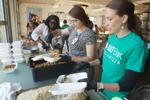When it comes to providing emergency food aid after a catastrophe, World Central Kitchen has a well-established method – fly in, set up sites to provide hot meals at least twice daily until the crisis eases, then fly out – sometimes leaving a community kitchen in the hands of local chefs and volunteers.
But after the mass shooting that killed 10 and wounded three people May 14 at the Tops Markets on Jefferson Avenue, that doesn’t apply. Tops, which is still closed, has been the only source of fresh food on Buffalo’s East Side.

The way World Central Kitchen mobilized in Buffalo shows how the organization quickly taps a network of staff and volunteers to find people in a community who can help and puts them to work getting meals to people in need.
“Normally with a natural disaster, we know what to look for to transition out – things like the power coming back on, restaurants reopening, the community getting back on its feet,” World Central Kitchen senior vice president for policy Elliot Kaye said during a visit here Monday. “We don’t want to disrupt the local economy long-term, so we step out and let it recover. But this is totally different.”
People are also reading…
World Central Kitchen set up shop on the corner of Jefferson Avenue and East Utica Street on May 18 and has twice extended its stay to serve a community that has come to rely on it, Kaye said. The agency wanted to finally pack up Monday, but instead, Kaye and two other officials flew in from Washington, D.C., to talk with local leaders about how to keep it going and set up services to replace it.
Kaye, along with chief operating officer Erich Broksas and vice president for relief Jason Collis, bagged produce supplied by the African Heritage Food Co-op and handed out meals in between meetings with representatives of the mayor’s office and the state Division of Homeland Security and Emergency Services.
But their main goal is to gauge what the community needs from World Central Kitchen, including how long it should stay in Buffalo, Kaye said.
A May 24 Civil Eats opinion piece by the University at Buffalo Food Lab’s Food Equity Scholars, led by professor Samina Raja, called for “community-driven structural investments, not fly-in, fly-out charity.”
Kaye said he reached out to the group to start the conversation with East Side community leaders, local and state government and grassroots food providers about “a community-led way for us to do what’s best for the community before we leave.”

Elliot Kaye, Vice President for Policy at World Central Kitchen, helps package produce for distribution at the WCK site on Jefferson Avenue Monday. Kaye and other WCK officials are in town to visit the site and consult with community leaders on how and when the emergency food relief org will pull out of Buffalo.
Janet Gramza
The conversation will include World Central Kitchen potentially staying on at least until the Tops reopens, Kaye said.
Also addressing the neighborhood’s food crisis was Sen. Kirsten Gillibrand, who visited the Resource Council of WNY to support its efforts, as well as those by FeedMore WNY and other local entities.
“The work being done has really made a difference,” Gillibrand said prior to a news conference and after chatting with volunteers distributing fresh produce, boxes of groceries and toiletries in the parking lot at the Resource Council.
She said that children are often the hardest hit with food insecurity, particularly during the summer months without access to school breakfast and lunch programs that are available to them during the school year.

In addition to extending increases that were made to federal programs like the Supplemental Nutrition Assistance Program during the pandemic and waiving some provisions that are about to expire so that more people in need can get access to food, Gillibrand talked about some long-term responses to the food insecurity in the community that the Tops served.
“We should be calling on all the different supermarket chains to put in a new supermarket in our community, and I will do that. I will make calls to all of those supermarket chains to come here,” Gillibrand said.
Gillibrand was joined at Monday’s news conference by Masten Council Member Ulysees O. Wingo, who represents the neighborhood that was served by the Jefferson Avenue Tops, along with Catherine Roberts, president and CEO of the Resource Council of WNY, and Catherine Shick of FeedMore WNY.
Shick said that food insecurity has been a problem in Buffalo long before the massacre at Tops left the East Side community without a supermarket.
“While community members urgently need access to fresh, nutritious food in the wake of this horrific tragedy and the closure of the Tops supermarket, we must also remember that food insecurity has been a longtime problem within the City of Buffalo, and throughout Western New York,” said Shick.
In 2019, she said, more than 18% of Buffalo residents were food insecure.
“In other words, these individuals lacked consistent access to enough food to lead a healthy life. And we know that when the donations slow down, this problem will remain unless we commit to lasting change,” Shick added.
Meanwhile, Kaye said the World Central Kitchen officials will be leaving Buffalo on Tuesday evening, but the conversation with the community will continue.
“We don’t want to stay too long,” he said, “and we don’t want to leave too soon.”








